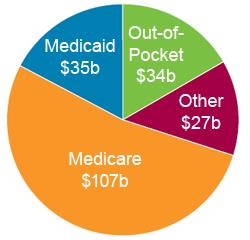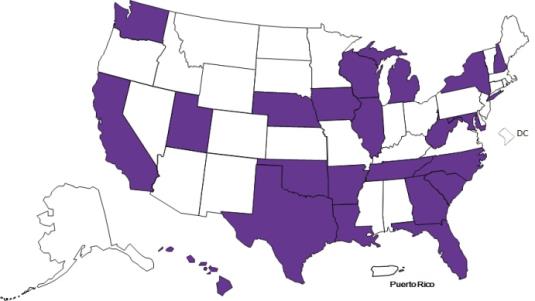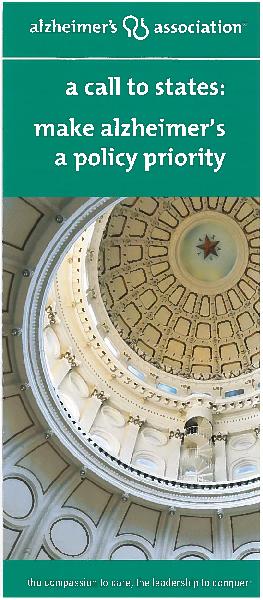|
Dementia is the Most Costly Disease in America

Dementia costs more to American society than heart disease and cancer – and is now the most expensive disease in the United States – according to an NIH-funded study recently published in the New England Journal of Medicine. The study found that with the aging of the baby boomers, the costs of dementia are expected to skyrocket.
According to the Alzheimer’s Disease Facts and Figures report, in 2013, caring for people with Alzheimer’s and dementia will cost the Medicaid program an estimated $35 billion. Average, annual, per-person Medicaid spending on seniors with Alzheimer’s disease or another dementia is 19 times higher than average per-senior Medicaid spending on those without Alzheimer’s. With the aging of the baby boomer generation, the number of Americans aged 65 and over with Alzheimer’s is expected to dramatically escalate, and the costs to Medicaid are estimated to increase nearly 400 percent by 2050.
The rising costs of Alzheimer’s disease are on a path that will cripple state budgets. A comprehensive strategy is needed.
Every state needs to publish and implement a comprehensive state Alzheimer’s disease plan. State Alzheimer’s disease plans create the infrastructure and accountability necessary to confront the sweeping economic and social impact of this disease. To date, 28 states have published a state plan, 13 states and the District of Columbia are in the process of writing a state plan, and three states are considering legislation that would establish a task force to develop an Alzheimer’s state plan.
Please click here to find copies of the state plans that have been published to date as well as state-by-state comparisons of the recommendations included in the published state plans.
One in Eight Older Americans Experience Cognitive Decline; Most Do Not Talk to a Doctor
 One in eight Americans aged 60 and over – 12.7 percent – say they have experienced worsening confusion or memory loss in the previous 12 months, according to data recently released by the Centers for Disease Control and Prevention (CDC). The data come from the state Behavioral Risk Factor Surveillance System (BRFSS) survey for 21 states that used the Cognitive Module in 2011. Of those experiencing worsening memory problems – known as “cognitive decline” - over 80 percent have not talked to a health provider it; and 1 in 3 says memory loss has interfered with household activities and/or work. For your state’s data, please visit alz.org/publichealth. One in eight Americans aged 60 and over – 12.7 percent – say they have experienced worsening confusion or memory loss in the previous 12 months, according to data recently released by the Centers for Disease Control and Prevention (CDC). The data come from the state Behavioral Risk Factor Surveillance System (BRFSS) survey for 21 states that used the Cognitive Module in 2011. Of those experiencing worsening memory problems – known as “cognitive decline” - over 80 percent have not talked to a health provider it; and 1 in 3 says memory loss has interfered with household activities and/or work. For your state’s data, please visit alz.org/publichealth.
 Given the lack of communication with a health care professional about worsening memory problems – and given that as many as half of those living with Alzheimer’s or another dementia have not been diagnosed – states need to address the need for early detection and diagnosis of the disease. Early detection and diagnosis are the best ways to provide better medical care and outcomes – and allow for the better management of multiple chronic conditions to enhance the quality of life. Early detection also enables individuals affected by the disease to plan for their future and access community-based services, both of which can reduce the use of more costly health care services and lessen the burden of caregiving on their families. More than a dozen state Alzheimer’s plans include recommendations on early detection and diagnosis, and this latest data show how important it is to implement those recommendations. Given the lack of communication with a health care professional about worsening memory problems – and given that as many as half of those living with Alzheimer’s or another dementia have not been diagnosed – states need to address the need for early detection and diagnosis of the disease. Early detection and diagnosis are the best ways to provide better medical care and outcomes – and allow for the better management of multiple chronic conditions to enhance the quality of life. Early detection also enables individuals affected by the disease to plan for their future and access community-based services, both of which can reduce the use of more costly health care services and lessen the burden of caregiving on their families. More than a dozen state Alzheimer’s plans include recommendations on early detection and diagnosis, and this latest data show how important it is to implement those recommendations.
State Successes Highlighted at 25th Anniversary Advocacy Forum
 More than 900 advocates from across the nation gathered in Washington, DC April 22-24 for the Alzheimer’s Association’s Advocacy Forum. Actor, Alzheimer's champion and longtime advocate David Hyde Pierce, honorary chair of the 2013 Forum, led the annual Roll Call of the States. Advocates from each of the 50 states and the District of Columbia - ranging from people living with Alzheimer's disease to Association volunteers and staff - delivered state policy accomplishments from the past year. Advocacy successes included implementation of state Alzheimer's disease plans, passage of the Uniform Adult Guardianship and Protective Proceedings Jurisdiction Act (UAGPPJA), dementia training for law enforcement, and Silver Alert legislation. As part of the Roll Call, Maryland State Senator Verna Jones-Rodwell, an Alzheimer's Association National Board member, spoke about her experience with the disease. Both of her parents had Alzheimer's. More than 900 advocates from across the nation gathered in Washington, DC April 22-24 for the Alzheimer’s Association’s Advocacy Forum. Actor, Alzheimer's champion and longtime advocate David Hyde Pierce, honorary chair of the 2013 Forum, led the annual Roll Call of the States. Advocates from each of the 50 states and the District of Columbia - ranging from people living with Alzheimer's disease to Association volunteers and staff - delivered state policy accomplishments from the past year. Advocacy successes included implementation of state Alzheimer's disease plans, passage of the Uniform Adult Guardianship and Protective Proceedings Jurisdiction Act (UAGPPJA), dementia training for law enforcement, and Silver Alert legislation. As part of the Roll Call, Maryland State Senator Verna Jones-Rodwell, an Alzheimer's Association National Board member, spoke about her experience with the disease. Both of her parents had Alzheimer's.
Advocate Impact Spotlight
Jennifer Cook, Oregon
 Oregon advocate Jennifer Cook knows what it means to be dedicated to a cause. After her father was diagnosed with mixed dementia, Jennifer shifted her career path to ensure she could be close to her father and help her mother care for him. Today, she helps other families too. Jennifer is the owner of a senior placement agency, which has provided her with an opportunity to understand the diverse needs of families affected by Alzheimer's. Oregon advocate Jennifer Cook knows what it means to be dedicated to a cause. After her father was diagnosed with mixed dementia, Jennifer shifted her career path to ensure she could be close to her father and help her mother care for him. Today, she helps other families too. Jennifer is the owner of a senior placement agency, which has provided her with an opportunity to understand the diverse needs of families affected by Alzheimer's.
Jennifer’s desire to find a way to influence policy and improve care for the thousands of constituents in Oregon who are living with Alzheimer’s and other dementias has turned her into an advocate. Jennifer serves as a “State Ambassador” for the Alzheimer’s Association’s Oregon Chapter. Her frequent meetings with lawmakers, participation in town hall meetings, and outreach to local media have helped Oregon keep Alzheimer’s at the forefront of health care discussions. Jennifer was recently invited to provide testimony at a public hearing on long-term care issues before the Human Services Committee in Oregon’s House of Representatives. Her story helped Committee members understand that Alzheimer's affects the whole family. The strength and passion that comes from advocates like Jennifer Cook are the driving force behind the movement to end Alzheimer’s disease.
Do you have a constituent who is part of the movement to end Alzheimer’s now? Would you like to honor an advocate in your state by sharing his/her story? If so, please email Jennifer Rosen at jrosen@alz.org to have your constituent’s story considered for the next “Advocate Impact Spotlight.”
|
|
State Policy Priorities
 The Alzheimer’s Association calls on state policymakers to focus on four key policy priorities: State Alzheimer’s Plans, UAGPPJA, dementia training, and data collection. To learn more about state legislation we support, click on the brochure at the left or visit our website. The Alzheimer’s Association calls on state policymakers to focus on four key policy priorities: State Alzheimer’s Plans, UAGPPJA, dementia training, and data collection. To learn more about state legislation we support, click on the brochure at the left or visit our website.
Opportunities to Learn More about Alzheimer’s State Policy
June 12: State Advocacy Day in Raleigh, NC. Contact Eileen McGuinness-Vaillancourt for more information, emcguinness@alz.org.
Additional Policy Resources
 Council of State Government’s (CSG) Knowledge Center on Dementia. Council of State Government’s (CSG) Knowledge Center on Dementia.
 National Conference of State Legislatures’ (NCSL) Alzheimer’s Disease Resource Center. National Conference of State Legislatures’ (NCSL) Alzheimer’s Disease Resource Center.
 Women in Government (WIG) Alzheimer’s Policy Resource Center Women in Government (WIG) Alzheimer’s Policy Resource Center
Contact
For more information on the Alzheimer’s Association’s state efforts, state policy agenda, or Alzheimer’s disease in general, contact Randi Chapman at rchapman@alz.org.
|

